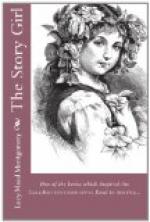Accordingly, after tea we all set off, armed with jugs and cups. Felicity, thoughtful creature, also took a small basketful of jelly cookies along with her. We had to go back through the maple woods to the extreme end of Uncle Roger’s farm—a pretty walk, through a world of green, whispering boughs and spice-sweet ferns, and shifting patches of sunlight. The raspberries were plentiful, and we were not long in filling our receptacles. Then we foregathered around a tiny wood spring, cold and pellucid under its young maples, and ate the jelly cookies; and the Story Girl told us a tale of a haunted spring in a mountain glen where a fair white lady dwelt, who pledged all comers in a golden cup with jewels bright.
“And if you drank of the cup with her,” said the Story Girl, her eyes glowing through the emerald dusk about us, “you were never seen in the world again; you were whisked straightway to fairyland, and lived there with a fairy bride. And you never wanted to come back to earth, because when you drank of the magic cup you forgot all your past life, except for one day in every year when you were allowed to remember it.”
“I wish there was such a place as fairyland—and a way to get to it,” said Cecily.
“I think there is such a place—in spite of Uncle Edward,” said the Story Girl dreamily, “and I think there is a way of getting there too, if we could only find it.”
Well, the Story Girl was right. There is such a place as fairyland—but only children can find the way to it. And they do not know that it is fairyland until they have grown so old that they forget the way. One bitter day, when they seek it and cannot find it, they realize what they have lost; and that is the tragedy of life. On that day the gates of Eden are shut behind them and the age of gold is over. Henceforth they must dwell in the common light of common day. Only a few, who remain children at heart, can ever find that fair, lost path again; and blessed are they above mortals. They, and only they, can bring us tidings from that dear country where we once sojourned and from which we must evermore be exiles. The world calls them its singers and poets and artists and story-tellers; but they are just people who have never forgotten the way to fairyland.
As we sat there the Awkward Man passed by, with his gun over his shoulder and his dog at his side. He did not look like an awkward man, there in the heart of the maple woods. He strode along right masterfully and lifted his head with the air of one who was monarch of all he surveyed.
The Story Girl kissed her fingertips to him with the delightful audacity which was a part of her; and the Awkward Man plucked off his hat and swept her a stately and graceful bow.
“I don’t understand why they call him the awkward man,” said Cecily, when he was out of earshot.
“You’d understand why if you ever saw him at a party or a picnic,” said Felicity, “trying to pass plates and dropping them whenever a woman looked at him. They say it’s pitiful to see him.”




